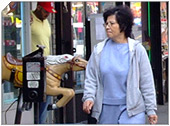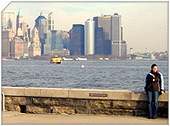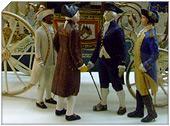Getting Started
Index
NYC Neighborhoods
Manhattan
Brooklyn
Queens
Bronx
Staten Island
NYC Icons
Chrysler Building
Flatiron Building
Empire State Building
Safe NYC
NYPD
FDNY
NYC Weather
NYC Climate
NYC Weather Forecast
Winter Season
Spring Season
Summer Season
Fall Season
NYC History & Politics
New York City History
Tammany Hall and Politics
New York City Politicians
New York City Personalities
Culture of Gotham City
Culture of the city
Cultural diversity
City in popular culture
|
Alan Greenspan (born March 6, 1926) is an American economist and was Chairman of the Board of Governors of the Federal Reserve of the United States from 1987 to 2006. Following his retirement as Fed chairman, he accepted an honorary (unpaid) position at HM Treasury in the United Kingdom.
First appointed Fed chairman by President Ronald Reagan in August 1987, he was reappointed at successive four-year intervals until retiring on January 31, 2006, at which time he relinquished the chairmanship to Ben Bernanke. Greenspan was lauded for his handling of the Black Monday stock market crash that occurred very shortly after he first became chairman, as well as for his stewardship of the Internet-driven, "dot-com" economic boom of the 1990s. However, this expansion culminated in a stock market bubble burst in March 2000 followed by a recession beginning in late 2000 and continuing through 2002.
From 2001 until his retirement, he was increasingly criticized for some statements seen as overstepping the Fed's traditional purview of monetary policy, and viewed by others as overly supportive of the policies of President George W. Bush, as well as for policies seen as leading to a housing bubble. Greenspan was nonetheless still generally considered during that time to be the leading authority on American domestic economic and monetary policy, and his active influence continues to this day.
Biography
Greenspan was born to a Jewish family in Washington Heights, New York City, New York. He studied clarinet at Juilliard from 1943 to 1944 and is known as an accomplished saxophone player . He then attended New York University (NYU), and received a B.S. in Economics (summa cum laude) in 1948, and an M.A in Economics in 1950. After NYU, Greenspan attended Columbia University, intending to pursue advanced economic studies, but subsequently dropped out. Much later, in 1977, NYU also awarded him a Ph.D. in Economics. He did not complete a dissertation, normally required for that degree. On December 14, 2005 he was awarded an honorary Doctor of Commercial Science from NYU, his fourth degree from that institution.
Starting in 1950, Greenspan began a 20-year association with famed novelist and philosopher Ayn Rand. He wrote for Rand's newsletters and authored several essays in her book Capitalism: The Unknown Ideal.
Greenspan has been married to NBC journalist Andrea Mitchell since 1997.
From 1948 to 1953, Greenspan worked as an economic analyst at The Conference Board, a business and industry oriented think-tank in New York City. From 1955 to 1987, Greenspan was Chairman and President of Townsend-Greenspan & Co., Inc., an economic consulting firm in New York City, a 33-year stint interrupted only from 1974 to 1977 by his service as Chairman of the Council of Economic Advisers under President Gerald Ford. In the summer of 1968, Greenspan agreed to serve Richard Nixon as his coordinator on domestic policy in the nomination campaign. Greenspan also has served as a corporate director for Aluminum Company of America (Alcoa); Automatic Data Processing, Inc.; Capital Cities/ABC, Inc.; General Foods, Inc.; J.P. Morgan & Co., Inc.; Morgan Guaranty Trust Company of New York; Mobil Corporation; and The Pittston Company.
|
New York City Search
Quick NYC
|



 New York Weather Forecast
New York Weather Forecast
 Ethnic composition
Ethnic composition


















